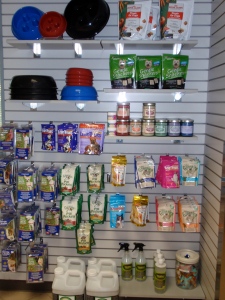Every veterinary practice needs someone to take responsibility for managing the practice’s inventory. This person might be the Practice Owner, the Practice Manager, an associate veterinarian, or an experienced technician or assistant. In any case, the hospital’s inventory manager must be: highly organized, familiar with veterinary drugs and products, and fiscally responsible.
In selecting the right person for the job, it’s important to look at the required strengths for performing the necessary duties.
- Ability to look creatively at the ‘big picture’ and identify the specific steps necessary to carry out the Practice Owner’s decisions, and the Hospital Administrator’s directives, and to work with all staff through the implementation process.
- Ability to differentiate between major and minor issues as they relate to inventory control and the care of clients and patients.
- Ability to handle misdirected negative emotion and behavior.
- Supportive and encouraging attitude towards staff. Expresses thoughts and ideas effectively. Recognizes the need to be “the support staff to the support staff”.
- Flexibility with regard to unexpected requests taking priority over planned duties.
- Ability to stay ‘on-task’ with minimal supervision, and accomplish required tasks by designated deadlines.
- Willingness to do whatever it takes to get the job done, when needed.
Every hospital probably has more than a few people on the team who possess these strengths. An Inventory Manager must be at least “above average” in all these areas in order to perform the responsibilities of the job. A candidate who cannot stay ‘on-task’ may quickly lose track of what is needed and you’ll find yourself running out of items. Alternatively, when an inventory manager fails to differentiate between major and minor issues, they may become bogged down with paperwork or meeting with representatives, overlooking the clinic’s need to keep inventory flowing so that patient care doesn’t suffer. Once you’ve narrowed down your field of potential candidates, you should take a look at the responsibilities expected of the inventory manager at your clinic, in order to find the ‘best’ candidate to fill the job.
Here is a summary of responsibilities that can be incorporated into a job description for your inventory manager:
Authority (defines who the Inventory Manager reports to and oversees)
Report to: Hospital Administrator (or Practice Owner, or Practice Manager)
Liaison with: All support staff and veterinarians
Oversee: N/A
Client Management (responsibilities that are directly related to client service)
- Fill all online client requests and orders.
- Anticipate client needs by maintaining the “standing food orders” and the “special food orders”, preventing clients from running out of specialty foods.
- Anticipate client needs by careful tracking of all special orders, notifying clients as soon as their orders have arrived.
- Audit the meds-out drawer each week, calling clients to determine whether or not they still need their medications.

Computer/Data Management
- Creation and maintenance of all inventory codes in veterinary management software.
- Creation and maintenance of all bill codes directly related to the dispensing of inventory items in veterinary management software.
- Creation of purchase orders for all incoming inventory via veterinary management software.
- Process all purchases via purchase order in veterinary management software, passing invoices/packing slips along to the Hospital Administrator on a daily basis.
- Submit website pricing/product changes to Webmaster on a monthly basis, or as needed.
Financial Management (responsibilities directly related to being fiscally responsible to the practice)
- Monthly adherence to the inventory budget. All budgetary overages must be reported to the Hospital Administrator (or Practice Owner) in a timely manner, with an explanation of the need for the overage.
- Price-shopping to negotiate and obtain the best pricing for the practice.
- Submit proposals for special “buy-in” opportunities to Hospital Administrator (or Practice Owner) for authorization.
Facilities, Equipment & Supplies
- Manage/order all drugs and hospital supplies for the practice.
- Manage/order all veterinary diet products for the practice.
- Manage/order all equipment for the practice, after final approval by the Hospital Administrator (or Practice Owner).
- Manage all equipment repairs.
- Manage/order all x-ray supplies including film.
- Manage/order all retail and over-the-counter products for the practice.
- Manage/order/purchase all cleaning supplies and client hospitality products for the practice.
- Maintain good working relationships with all vendors by meeting with them on a regular basis (monthly or quarterly is ideal).
- Stock all workstations twice daily (AM and PM).
- Stock hospital pharmacy daily (AM).
- Stock food display area twice daily (AM and PM).
- Stock retail display area daily.
- Keep all food supplies at optimum levels, keeping available space and client demand balanced. Rotate and organize all food supplies frequently (at least weekly at a minimum).
- Work hospital and kennel staff to keep the hospital cupboards and storage areas organized and at optimum hospital need levels (fluids, lines, needles, injectibles, anesthetic agents, etc.)
- Unpack all deliveries, as they arrive, rotating all inventory stock.
- Pull expiring medications off the shelves 30 days prior to expiration and submit to appropriate vendors for clinic credit.
- Conduct monthly inventory count for accounting purposes. Inventory count is due no later than the 7th of each month.
- Notify staff and veterinarians of any/all back-orders and/or changes to products, as needed.

Now that you’ve outlined the responsibilities, relative to your practice, the next step should be to determine how much time this would take someone in your practice to perform on a weekly basis. It would be wise to do this yourself if you are the Practice Owner or Manager, and you are hoping to train someone else to perform these duties. I would recommend you do this for a full quarter cycle, so you will have a strong base to compare to once you’ve delegated the inventory responsibilities. This will also assure that the practice has a “back-up” person who can assume the inventory responsibilities in case of vacations or absences.
Keep in mind that simply because you have a Inventory Manager, you cannot “wash your hands” of everything that has anything to do with inventory management. It is important to remember that oversight must be in place. Someone, namely the Practice Manager or Owner must be a part of the checks and balances process. The Inventory Manager maintains control of a very large asset, namely the products that are kept on the shelf and sold/used in the course of practicing veterinary medicine. As a Practice Manager, I see every invoice and packing slip after it has been processed by the Inventory Manager. I see every order that is placed online via an email sent directly to my inbox once an order has been placed. I also calculate the net value of on-hand inventory based on the “count” submitted each month by the Inventory Manager, submitting these numbers to the bookkeeper each month. These steps are in place to balance and protect the Inventory Manager, as well as the Practice Owner’s interests.
Once you know what you need, and what it’s going to take to keep your inventory system flowing at maximum performance, take your time in choosing the person for the job. Management of inventory is one of the most under-appreciated jobs in the field of veterinary medicine, but it is a crucial one to the smooth flow of client service, patient care, and your practice’s bottom line.

1 comment
Comments feed for this article
July 22, 2009 at 5:53 am
Veterinary Hospital Inventory Managers: Guidelines & Duties …
[…] Practice Manager, I see every invoice and packing slip … //–> Read the original post: Veterinary Hospital Inventory Managers: Guidelines & Duties … //–> This entry was posted in Blog Meme and tagged are-kept, invoice-and, namely-the, […]